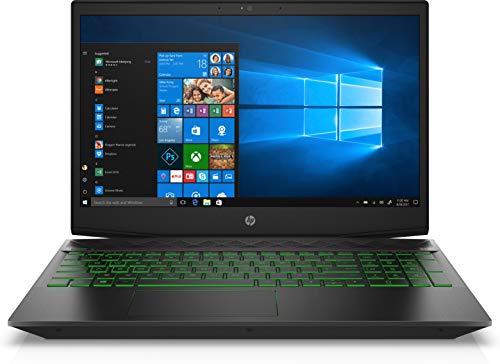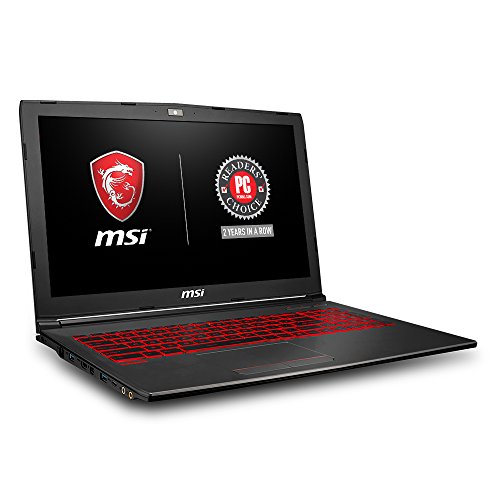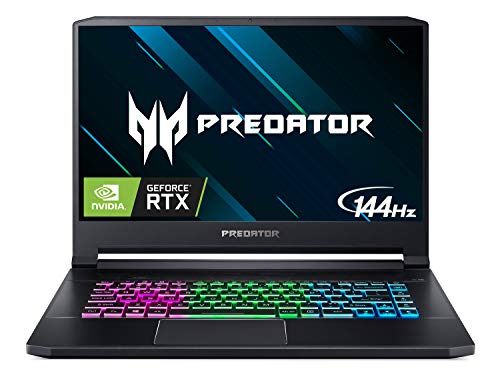Table of Contents
When looking for a great gaming Laptop for games such as Fortnite, PUBG, Rainbow Six Siege, Counter-Strike: Global Offensive, Call of Duty, Overwatch, Apex Legends, League Of Legends, and more, it can be quite difficult depending on which of those games you enjoy playing and your budget.
Therefore, we have created a guide that explains what you should look for in the components of a gaming laptop, and why they matter. Followed, we’ll take a look at a comprehensive list of our recommended gaming laptops at various price points and performance levels ordered from cheapest to most expensive.
Contents
- Gaming Laptop Guide
-
Best Gaming Laptops:
- Razer Blade 15 RTX Gaming Laptop
- MSI GS65 Stealth THIN-051 Gaming Laptop
- Gigabyte AERO 15-X9-RT5P Gaming Laptop
- ASUS ROG Zephyrus S Gaming Laptop
- Acer Predator Triton 500 Gaming Laptop
- ASUS ROG Strix Hero II Gaming Laptop
- MSI GV63 8SE-014 Gaming Laptop
- HP Omen 15 Gaming Laptop
- Acer Predator Helios 300 Gaming Laptop
- ASUS TUF FX504 Gaming Laptop
- MSI GV62 Gaming Laptop
- HP Pavillion Gaming Laptop
Gaming Laptop Guide
When you’re buying the laptop, you’ll find its specs being advertised, which is a list of all the components. Let’s take a look at which ones make the biggest impact in terms of gaming.
CPU – The CPU, or the processor, is the laptop’s brain. Even though some might argue that the GPU is more important for gaming, there are CPU-intensive games such as Counter-Strike: Global Offensive which make use of the CPU more than the GPU. You’ll usually find Intel’s i3, i5, and i7 processors here, with some high-end options going up to an i9. While an i3 CPU may do the job, jumping to an i5 or i7 would make a world of difference.
GPU – The GPU is the graphics processing unit. It is directly responsible for many of the visuals in a game and makes a huge impact. The most common budget-oriented GPUs are Nvidia’s GTX 1050 Ti and GTX 1060, with higher end laptops opting for a GTX 1070 or GTX 1080, as well as the ray tracing enabled RTX 2060, RTX 2070, RTX 2080 and RTX 2080 Ti. Higher end GPUs do have a big impact on the price, but if you’re serious about gaming, they’re often worth it.
RAM – RAM stands for Random Access Memory and is mostly responsible for multitasking. In general, day-to-day use, 8GB of RAM has become the norm. However, higher-end gaming rigs or work rigs often have 16GB or 32GB of RAM. For a great gaming experience, we would recommend going for a 16GB option. That would also add some futureproofing as well.
Display Quality – Unless you’re going to be attaching the laptop to an external monitor most of the time, the display is very important. You’ll find two options – TN (Twisted Nematic) and IPS (In-Plane Switching) panels. While IPS offer better color reproduction and viewing angles, TN panels often have higher refresh rates. When gaming, a higher refresh rate (120Hz or more) is preferred, provided the laptop can achieve that frame rate with the games you’ll be playing.
Battery Life – Battery life is an area where you shouldn’t have high expectations, regardless of the price. Most gaming laptops are often used plugged in, but if you care about battery, you should know that you’ll get two to three hours at most with a gaming laptop. If you’re gaming on battery power, that may be even less.
Storage – With hard drives fading away, you’ll want a laptop with a solid-state drive (SSD), which is much, much faster. However, SSDs are still somewhat expensive. Most midrange laptops will offer a small (120GB or 240GB) SSD for your operating system and a game or two, as well as a 1TB or 2TB hard drive. High-end machines come with large (500GB or 1TB) SSDs meant to be used as primary storage. It’s a matter of how much you can spend on a laptop. And, most offer upgradeable storage, so this is something you could improve down the line. Note that a faster type of storage will only help with loading times – not actually improve gaming performance.
Thermal Solution (Cooling) – Some laptops still do have issues with thermal performance. Even though we’ve come to a time where you have dual-fan configurations, there are some CPUs (notably Intel’s i9 lineup) as well as some GPUs that require hefty cooling solutions. This often results in thick, heavy laptops. However, if you get a laptop by a reputable manufacturer, such as the ones below, you shouldn’t have anything to worry about in terms of thermals. There are some innovative solutions such as Razer’s Vapor Chamber that make this even less of a concern.
Portability – It’s no secret that portability and gaming don’t go along in the laptop industry. Many gaming laptops weigh an excess of 6lbs, which is not really portable. But then again, you have options such as the Gigabyte Aero (4.49lbs) or the MSI GS65 Stealth (4.19lbs), which are impressively lightweight, yet perform admirably.
Gaming Laptops – Reviews & Recommendations
Now that we saw which components are important, and why, let’s take a look at the best gaming laptops we recommend for the games above. They’re ordered from the cheapest one to the most expensive, so there’s something for everyone’s budget.
-
HP Pavillion
CPU: Intel Core i5-8300H | GPU: Nvidia GeForce GTX 1050 Ti 4GB | RAM: 8GB | Storage: 1TB HDD

The 1TB hard drive may be slow, but it can certainly store quite a lot of games and can be easily upgraded to an SSD. You also get a 15.6” 1080p IPS anti-glare display with the HP, which has excellent viewing angles and good sharpness. Sure, you won’t get 144 frames per second with this laptop, but at this price, it’s still an excellent bang for your buck.Features:
- Good for 1080p gaming
- Quad-core CPU
- 1080p IPS display
- Backlit keyboard

|
-
MSI GV62
CPU: Intel Core i5-8300H | GPU: Nvidia GeForce GTX 1050 Ti 4GB | RAM: 8GB | Storage: 1TB HDD + 16GB Intel Optane

With the RAM you have two sockets, and even though the laptop comes with 8GB of RAM, you can upgrade this to up to 32GB. There’s also a 1TB hard drive, as well as Intel’s Optane storage. Optane is made to significantly improve the loading times for certain programs, as well as provide fast access to files. The GV62 has a red backlight on the keyboard and is very well built.Features:
- Good for 1080p gaming
- Quad-core CPU
- 1080p IPS display
- 16GB of Intel Optane storage
- Backlit keyboard

|
-
ASUS TUF FX504
CPU: Intel Core i5-8300H | GPU: Nvidia GeForce GTX 1060 3GB | RAM: 8GB | Storage: 256GB SSD

And you’ll be able to see those decent framerates, thanks to the 1080p 120Hz refresh rate display. Storage is also much faster – there’s a 256GB M.2 SSD instead of a traditional hard drive. It’s a great performer if you don’t mind that you only have 256GB of storage.Features:
- Great for 1080p gaming
- Quad-core CPU
- 1080p IPS display with a refresh rate of 120Hz
- Backlit keyboard

|
-
Acer Predator Helios 300
CPU: Intel Core i7-8750H | GPU: Nvidia GeForce GTX 1060 6GB | RAM: 16GB | Storage: 256GB SSD

You get 16GB of DDR4 RAM, as well as a very fast, 256GB PCIe NVMe SSD. The IPS 1080p display has a 144Hz refresh rate. The Helios 300 should be able to increase those framerates with games such as Rainbow Six: Siege, League of Legends, Fortnite, and more.Features:
- Excellent for 1080p gaming
- Six-core CPU
- 1080p IPS display with a 144Hz refresh rate
- NVMe SSD
- Backlit keyboard

|
-
HP Omen 15
CPU: Intel Core i7-8750H | GPU: Nvidia GeForce GTX 1060 6GB | RAM: 16GB | Storage: 128GB SSD & 1TB HDD

The Omen comes with 16GB of DDR4 RAM, which is upgradeable, and two storage drives. One is a very fast 128GB NVMe SSD, and the other one is a 1TB hard drive. The IPS anti-glare display offers incredible viewing angles and a sharp 1080p resolution.Features:
- Excellent for 1080p gaming
- Six-core CPU
- 1080p IPS display
- NVMe SSD
- Backlit keyboard

|
-
MSI GV63 8SE-014
CPU: Intel Core i7-8750H | GPU: Nvidia GeForce RTX 2060 6GB | RAM: 16GB | Storage: 256GB SSD & 1TB HDD

Its 16GB of RAM should take care of your multitasking needs, and there are two storage drives. One is a 256GB NVMe SSD for your OS and a game or two, and the other is a 1TB hard drive. The display is a 1080p panel with a 120Hz refresh rate. With these specs, the GV63 should easily hit 120 frames per second in games such as Fortnite, League of Legends and Apex Legends.
Features:
- Amazing for 1080p gaming
- Six-core CPU
- Ray tracing enabled RTX graphics card
- 1080p IPS display with a 120Hz refresh rate
- NVMe SSD
- Backlit keyboard

|
-
ASUS ROG Strix Hero II
CPU: Intel Core i7-8750H | GPU: Nvidia GeForce RTX 2060 6GB | RAM: 16GB | Storage: 512GB SSD

There is 16GB of DDR4 RAM to take care of all of your multitasking needs, as well as a 512GB PCIe SSD. This is both very fast, and quite a bit of storage. The ROG Strix Hero is rounded off by a 1080p IPS display with a refresh rate of 144Hz and a 3ms response time.
Features:
- Amazing for 1080p gaming
- Six-core CPU
- Ray tracing enabled RTX graphics card
- 1080p IPS display with a 144Hz refresh rate
- NVMe SSD
- RGB backlit keyboard

|
-
Acer Predator Triton 500
CPU: Intel Core i7-8750H | GPU: Nvidia GeForce RTX 2060 6GB | RAM: 16GB | Storage: 512GB SSD

With Intel’s i7-8750H six-core CPU and Nvidia’s GeForce RTX 2060 graphics card with 6GB of memory, the Triton 500 should easily hit high framerates in games such as League of Legends, Apex Legends and Fortnite. 16GB of RAM is plenty for all of your multitasking needs, and there’s a 512GB PCIe NVMe SSD. A 144Hz refresh rate, 1080p IPS display and an RGB backlit keyboard round off the package.
Features:
- Amazing for 1080p gaming
- Six-core CPU
- Ray tracing enabled RTX graphics card
- 1080p IPS display with a 144Hz refresh rate
- NVMe SSD
- RGB backlit keyboard
- Thunderbolt 3 USB Type C port

|
-
ASUS ROG Zephyrus S
CPU: Intel Core i7-8750H | GPU: Nvidia GeForce RTX 2070 8GB | RAM: 16GB | Storage: 512GB SSD

Even though this spec can easily run titles such as Apex Legends or Fortnite, you can also get respectable framerates from more demanding titles like PUBG. Its 16GB of RAM allows for quite a bit of multitasking, and a 512GB PCIe NVMe SSD is plenty of fast storage. Aside from the 15.6” 1080p 144Hz IPS display, the ROG Zephyrus S also has a somewhat unconventional design, where the keyboard and trackpad are next to each other and near the front edge of the laptop.
Features:
- Amazing for 1080p gaming
- Six-core CPU
- Ray tracing enabled Nvidia GeForce RTX graphics card
- 1080p IPS display with a 144Hz refresh rate
- NVMe SSD
- RGB backlit keyboard with Aura Sync

|
-
Gigabyte AERO 15-X9-RT5P
CPU: Intel Core i7-8750H | GPU: Nvidia GeForce RTX 2070 8GB | RAM: 16GB | Storage: 1TB SSD

The 16GB of RAM included is plenty even for heavy multitaskers, and Intel’s 760P PCIe NVMe SSD in a 1TB capacity should easily store all of your games and software. You get a 1080p IPS display made by LG, which has a refresh rate of 144Hz and is -Rite Pantone certified for color calibration. You get a per-key RGB backlit programmable keyboard and a Thunderbolt 3 port. Killer’s DoubleShot Pro network card is also included for lag-free gaming.
Features:
- Amazing for 1080p gaming
- Six-core CPU
- Ray tracing enabled Nvidia GeForce RTX graphics card
- 1080p IPS display with a 144Hz refresh rate
- NVMe SSD
- RGB backlit keyboard with per-key lighting
- Thunderbolt 3 support
- Killer DoubleShot network card

|
-
MSI GS65 Stealth
CPU: Intel Core i7-8750H | GPU: Nvidia GeForce RTX 2070 Max-Q 8GB | RAM: 16GB | Storage: 256GB SSD

There is a single 16GB DDR4 RAM stick, but two slots, so you can easily upgrade the RAM to 32GB. Storage is taken care of by a 256GB SSD, and there’s Intel’s Thunderbolt 3 technology too, as well as a per-key RGB backlit keyboard. The 1080p display isn’t IPS, but it does have thin bezels and fairly wide viewing angles, as well as a 144Hz refresh rate.
Features:
- Amazing for 1080p gaming
- Six-core CPU
- Ray tracing enabled Nvidia GeForce Max-Q graphics card
- 1080p anti-glare display with a 144Hz refresh rate and wide viewing angles
- NVMe SSD
- RGB backlit keyboard with per-key lighting
- Thunderbolt 3 support
- Killer DoubleShot network card

|
-
Razer Blade 15 RTX
CPU: Intel Core i7-8750H | GPU: Nvidia GeForce RTX 2080 Max-Q 8GB | RAM: 16GB | Storage: 512GB SSD

The Vapor Chamber cooling system keeps everything cool, even under load. You also get a 144Hz 1080p display which is factory color calibrated. With these components, you could run titles such as Counter-Strike: Global Offensive or Rainbow Six: Siege with ease and get high frames per second, and the laptop wouldn’t struggle with AAA titles either.
Features:
- Amazing for 1080p gaming
- Six-core CPU
- Ray tracing enabled Nvidia GeForce RTX Max-Q graphics card
- 1080p factory color calibrated display with a 144Hz refresh rate
- NVMe SSD
- RGB backlit keyboard with Razer Chroma support
- Thunderbolt 3 support
- Vapor Chamber cooling

|
Games The Laptops Above Can Run (System Requirements Linked)
These are a few of the many PC games the gaming laptops reviewed above can play. A link to the system requirements of each game is included:
- Apex Legends
- Fortnite
- PUBG
- Rainbow Six Siege
- League of Legends
- Grand Theft Auto V
- Counter-Strike: Global Offensive
- Overwatch
- Rocket League
- Call of Duty Black Ops 4 Blackout
- Rust
- Minecraft
- World of WarCraft
- Slay the Spire
- Battlefield 5
- Arma 3
- Dota 2
- Hearthstone: Heroes of Warcraft

